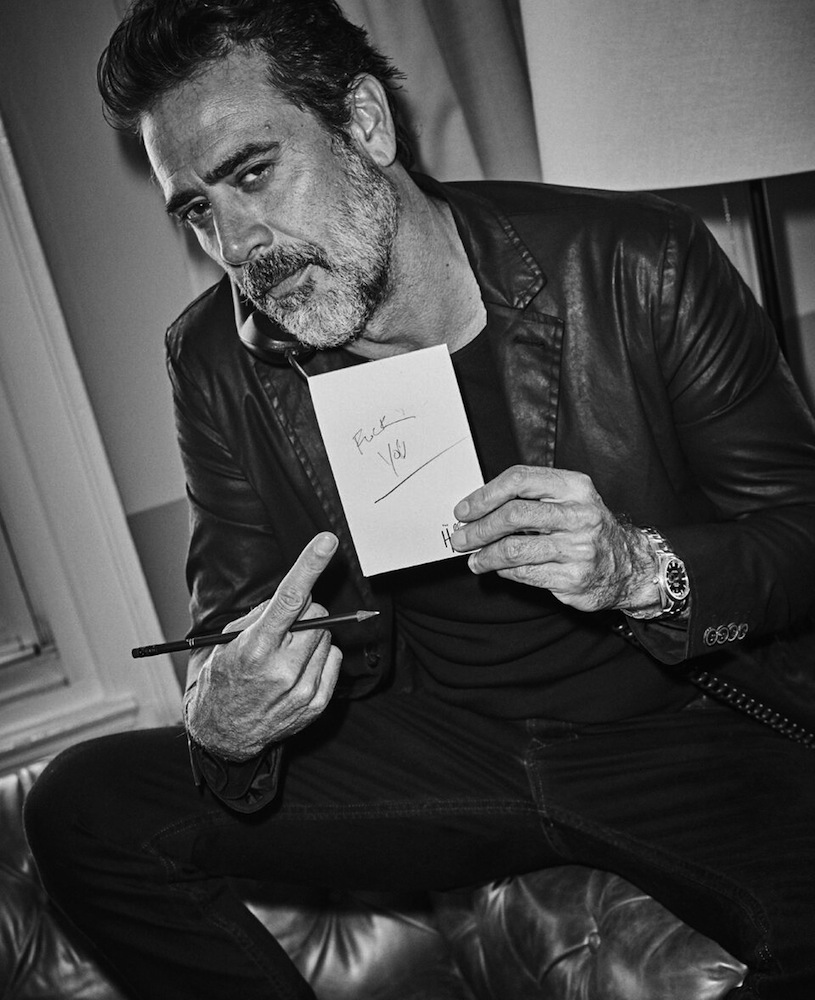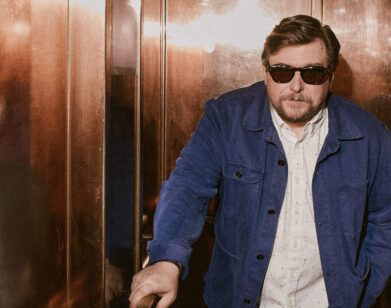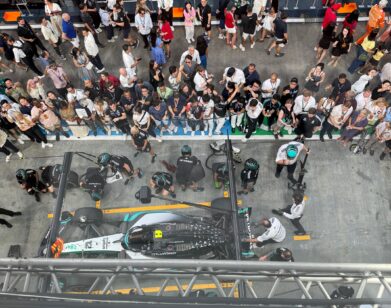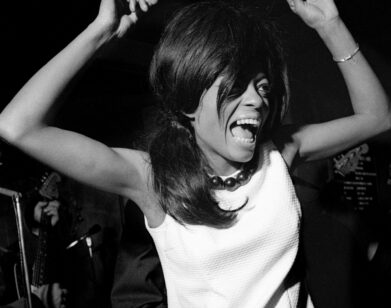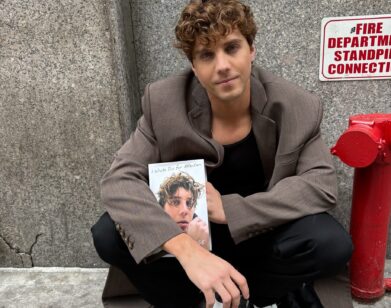Jeffrey Dean Morgan
JEFFREY DEAN MORGAN AT THE HOLLYWOOD ROOSEVELT IN LOS ANGELES, SEPTEMBER 2016. PHOTOS: ERIC RAY DAVIDSON. STYLING: TIFFANI CHYNEL/THE WALL GROUP. GROOMING: DAVID COX/ART DEPARTMENT USING R+CO.
This interview contains spoilers for the Season Seven premiere of The Walking Dead.
Last night, with a few swings of a barbed wire bat named Lucille, Jeffrey Dean Morgan made a brutal entrance as the villainous Negan on AMC’s The Walking Dead. While he appeared on screen for about 12 minutes during the Season Six finale, yesterday was his true debut, and it was show of force; Negan killed Glenn Rhee (Steven Yeun), an adored staple since Season One, and series regular Abraham Ford (Michael Cudlitz). For once, the walkers in the apocalypse are the least of Rick Grimes (Andrew Lincoln) and rest of the The Survivors’ worries. Negan is in control, and as he says, it’s a “brand new beginning.”
For Morgan, the New York-based actor portraying Negan, the leader of The Saviors—The Survivors’ adversary group—joining the show means spending much of his year shooting in rural Georgia, and entering a world he was a fan of for years. Morgan likens this season to a chess match between the two groups, in which Negan is “always a move or two ahead of everybody.” He also reminds us that the difference between the two groups is not as vast as one might think: The Survivors have made their fair share of deadly decisions, too. “Negan as a man is different than what we know from The Survivors, but the rules of survival I think he’s been very smart in, in keeping people alive,” says Morgan. “The Saviors have become the ruling class because they have the numbers, The Sanctuary, and they have figured it out. Now, how he rules is a lot different than how Rick Grimes rules, but there are a lot of similarities in there. I think anybody that’s made it this far in that world, there’s a key to it, and they all follow that big key.”
We caught up with Morgan on Saturday, just ahead of the highly anticipated premiere, and again earlier today. He was relieved to finally speak about Negan’s carnage after nearly seven months of “having to talk about not talking.” The fact that TSA agents can no longer tell him, “Oh yeah, you want to get on your plane? Then maybe you should tell us who you kill,” is another plus.
HALEY WEISS: I know you were a fan of The Walking Dead before you joined the cast. Can you tell me a bit about how you became involved?
JEFFREY DEAN MORGAN: I’d watched the show for years. It was one of the few shows that I would DVR and pay attention to; I’ve been working so much the last few years that I don’t watch anything very regularly but that was one of them. I’ve also been involved in lots of comic book stuff; I’ve done numerous films based on comic books and TV shows. I remember five years ago when they had written the role of Negan—when [Robert] Kirkman first introduced Negan in the comic books—I was at a Comic-Con actually, I think it was in San Diego, when somebody came up to me and said, “Have you seen Kirkman’s new book?” I said, “No,” and they said, “There’s this character Negan. You should be Negan.” Probably three or four months later, I actually did pick up a copy of The Walking Dead comic book, which at that point I hadn’t read; I had only followed the show. I picked up the introduction of Negan and thought, “Oh yeah, that would be fun to play.” Cut to five years later, I was doing The Good Wife and got a call one night from my agent who said, “The Walking Dead is offering you the role of a villain.” I said, “Well, what’s his name?” And they were like, “You know, they won’t tell us, it’s a secret.” And I knew immediately—I knew because I watched the show and knew where we were—and I’m like, “It’s fucking Negan! And I’m going to fucking do it.” [laughs] And really that was it. Then it was just about working that last episode last year into the schedule that I was doing on The Good Wife, and clearing a couple of days so I could go do it. We managed to do that and now here we are, a day before the big premiere.
WEISS: Negan’s background is that he was a high school teacher and a ping-pong coach, right?
MORGAN: That’s right. That changed; Kirkman originally had said he was a used car salesman previous to the zombie apocalypse, and that made sense to me too. Then after I was cast, Kirkman decided he would do a kind of prequel—Negan’s life before the apocalypse hit—with a little background on him. He became this PE teacher and ping-pong coach, married to a woman named Lucille, and it gave a good foundation for me to work on. I kind of like the ping-pong coach aspect; it somehow fits, and I don’t know how because Negan is a weird character, but it fits.
WEISS: I can imagine him being very tough on his ping-pong prodigies back then.
MORGAN: Well yeah, he uses the same language; it’s all expletives and teaching ping-pong. In the thing that Kirkman did, you see him teaching ping-pong, and he’s swearing up a storm. It was pretty funny to see Negan as a ping-pong coach. Cut to five years later and who he’s become now, it’s a pretty fun thing. But he was always, even when he was coaching ping-pong or teaching phys. ed., there was still that Negan in him. I think he was just a bully, probably in high school, that had a cutting sense of humor and that’s just carried over. But it was kind of neat having that, not only what he did before the apocalypse, but when the zombies start taking over the world; his wife passes away from cancer in a hospital when the apocalypse hits, so he’s in the hospital when it hits, and it follows him as he strikes out on his own. He’s trying to help people, he’s trying to get people to stay alive in this time, and no one listens to him and they all end up dying. I think that molds him into the guy he is today, where you’ve got to follow his rules or you’re going to get a baseball bat to the head type of thing. He got sick of people dying on his watch, and so he became the leader that he is now.
WEISS: When you go into a role like this, that does have a basis in the comic books as well as the writing of the show itself, do you build any other backstory internally? Are you of the belief that if it’s not on the page, it didn’t happen?
MORGAN: It would depend, but I didn’t [build any]. I think there was a wealth of information, certainly in the graphic novel. That being said, I don’t want to follow it exactly. I’m not trying to replicate what they did in the comic books. A lot of the dialog of course is similar, but I still want to make Negan, I want to say, my own. But I want to be able to share what we’re seeing on screen with the likes of Kirkman and [showrunner Scott] Gimple, because it’s different bringing something to life as opposed to replicating what you see on a graphic novel panel. There’s a lot of things that we don’t see in the graphic novels, so if you’re trying to follow that—which I’ve done before, we did that in Watchmen, where it’s almost frame for frame with the comic book—with this I needed a little bit of room to breathe, and there’s also stuff in the TV series that isn’t in the graphic novel. That gives me a little bit more space to put my spin on it. There are definitely things that I’ve garnered in looking at the graphic novel … He does this lean back in the graphic novel that somehow caught my eye on the initial read, and I’ve created how he moves based on one panel of the comic book where I see him leaning back and smiling.
WEISS: The show obviously has such a devout fan base. Are you at least a little bit sheltered when you’re filming in Georgia?
MORGAN: Yeah, we kind of live in a bubble. I hang out a lot with Reedus—Norman—we spend a lot of time together. Literally, we go to fucking gas station in the middle of nowhere and within three minutes of us stopping to get gas, a couple of phone calls that people make, and there’s 100 people blocking us and we can’t get out. We take pictures with everyone, and I’ve never seen anything quite like that. That being said, we do live in a bubble, as long as we keep our motorcycle helmets on and go about our business.
WEISS: Have you fallen victim to Norman’s pranking yet?
MORGAN: [laughs] No. Little stuff, but that’s really the two of them, Andy [Lincoln] and Norman. I drive a motorcycle, and Norman will respect the motorcycle more than anything else. We’re more in cahoots than anything else at this point, although I do kind of feel bad for Andy. I feel like I need to get Andy’s back and help him get Norman at least once real good.
WEISS: I know you’ve played villains recently, so I wonder if you’re now attracted to those roles? Is that something you’re looking for in scripts?
MORGAN: If you look at my résumé, I’ve more often than not played a very solid, decent human being. I’ve got back-to-back things that are super villainous right now with Desierto and this. I love playing a villain. I think that there’s something freeing about that, and it’s a different kind of challenge. More than anything, for me as an actor, it’s about challenging myself and doing as many different things as I can. I don’t know that I feel comfortable playing a villain; as a matter of fact I probably don’t feel comfortable, which is why I like it so much. It’s just an opportunity to try something different. And Negan in particular is unlike any character I’ve ever played. I don’t ever look at these guys as villains per se; I always try to figure out, I wouldn’t say the justification of them, but look for the reasons that Negan is Negan. I have to understand that, otherwise I don’t think it works if I just play him as a bad guy—I think that’s pretty one note and it would be boring for you as a viewer, and it wouldn’t be that fun for me to play. So I just try to get into that character’s skin as much as I can, and understand why he is who he is. Negan is a trip though, man. He’s a brutal son of a bitch, but there are also parts about him that I find kind of endearing. We’ll see if the audience responds to it. I think that the first episode is going to be rough, and people aren’t going to be real fond of me or Negan, and I think as time wears on and you get to know him a little bit more and understand his way of thinking, there could be a shift in that. Maybe they’ll love to hate him as opposed to just hating him.
WEISS: I was thinking about how odd it must’ve been to join this ensemble cast, come in as this huge character in the series, and immediately the power dynamic of the show shifts when you arrive. When you went on set, did you separate yourself before getting into those first scenes?
MORGAN: Obviously, they’re such a tight cast, and we’ve all heard stories about it and read about it for the last six years—even I had heard it was like that—and they certainly are. I knew that immediately walking in, and knowing what I’m about to do, there was a little bit of separation at first but it was very brief. I can’t tell you how great this cast is as far as bringing me into the fold, regardless of what my character has done and done to this show. They’ve totally embraced me and been nothing but supportive, on and off camera. Look, we’ve had some hard times—just as actors it’s been hard—and I understand that there’s been a great deal of pain for these guys as people. They’re losing a friend that’s been with them for a long fucking time. So it was a hard time initially, at first especially, and this year we’ve had some speed bumps as far as that kind of stuff. But I’ll tell you, as soon as we say cut, there’s lots of hugs going around for everybody and we’ve managed to get through it. But it was a little a weird going in initially when I didn’t know anybody really. I was careful not to be a dick, I guess. [laughs] Like, “Don’t say anything inappropriate, Jeff.” Now I can be inappropriate and tell jokes and it’s fine, but I was careful going in, because it was a fragile time for everybody, and I was very aware of it.
WEISS: That’s great. I was struck when watching the Season Seven premiere that it’s the first episode where there doesn’t seem to be much concern about the zombies themselves.
MORGAN: Yeah, I think that’s kind of the theme of the season. After six years of zombies being the threat, now you’re going to realize that people are the threat. There’s always going to be zombies there to contend with, but we know how to deal with zombies at this point. It’s a different world.
WEISS: Can you tell me which was the most difficult scene to film of that episode? Beforehand I would’ve imagined it’s the killing scene, but when Carl’s arm almost gets chopped off—
MORGAN: I think maybe it was the Carl’s arm bit to be honest with you. Look, that whole episode was hard, and also because I did go through and smack everybody with Lucille at a certain point. Everybody took a hit. All of that was hard. It got to the point where I didn’t want to do it anymore. … Emotionally I was completely drained—all of us were, I would imagine. Andy and I just went through the ringer. It was a hard episode, and having to get there time and time again to do these horrible things… They’re all good people, and I love them—the whole cast—so to keep riding them as hard as I was riding them, in-between takes it was like, god, you’ve got to catch your breath a little bit. It was just so fucking heavy at all times. In the show that aired, there’s no let up, and it was like that for 10 days for us. It wasn’t just 40 minutes of it; it was 10 days of that, every day, all day.
WEISS: Looking toward the rest of the season, is there a particular aspect of Negan’s personality that you’re looking forward to people seeing?
MORGAN: I think that as we get to know him and see him in quieter moments, you’ll see his charisma and his humor in a way that will be different than Lucille crashing into somebody’s face, which I think will help. It’s hard for me to go, “Look, he’s very charismatic and he’s got this incredible wit to him,” when I’m killing people. I don’t know if anyone’s ever going to truly look at Negan and go, “Oh, yeah, I get it! There’s a guy in there that’s awesome.” That’s the nature of the beast. Not that I’m going to make excuses for Negan, but we seem to forget as an audience, and as fans of the show, that Rick and Daryl and the rest of them killed probably 30, 40 of my men, and so far I’ve only killed two of them. Negan just did it with some panache. [both laugh]
WEISS: I’m curious—now that you’re Negan—what was your first-ever acting role?
MORGAN: It was in third grade, and it was a fairytale, the guy that falls asleep forever … I remember I played the character that was asleep the whole time. I was the big leader of the show, mind you. But I spent the whole time lying on the floor asleep. It was awesome. That was first little theater thing in third grade. A friend of mine, Billy Burke, was my roommate in Seattle for a big portion of my life, and he’s an actor—he was in all of the Twilight movies and now he’s on something called Zoo—and he was doing a movie in Seattle, I think it was the late ’80s, and I was an extra as his best friend. That was my first time on a movie set. I had no intention of being an actor ever. I was an artist—I fancied myself an artist—I sold paintings at bars to pay my rent. And then four years later, I moved to Los Angeles and met a casting director named Eliza [Roberts] and went from there. Then I spent 20 years struggling trying to figure out how the fuck I was going to make a living and feed my dog. And now we’re doing okay. Now we’re Negan.
WEISS: Do you still paint at all?
MORGAN: I don’t. I’ve got all the stuff and I keep threatening to. I mess around with my kid, but I do more photography now—I’ve done more photography for the last ten years, I picked that up—but someday. Someday I promise I’m going to do it, or at least I keep promising myself I’m going to do it. I haven’t in so long.
WEISS: Well, you have a lot on your hands with this role.
MORGAN: That’s true. I’ve got a lot on my hands with Negan. With Negan and my kid, my hands are full.
THE WALKING DEAD AIRS SUNDAYS NIGHTS ON AMC.

